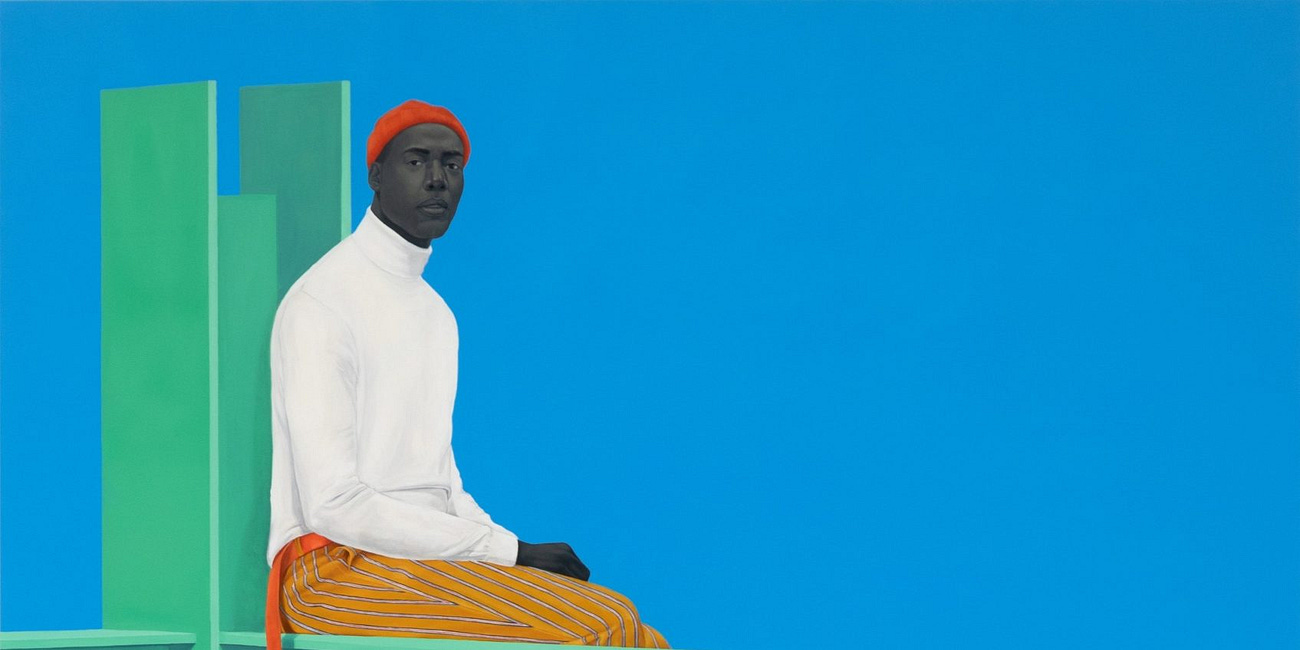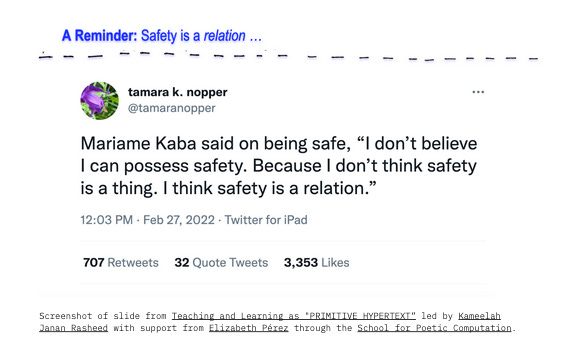In Search of The Most Resonant Metaphor
Like Cykofa, Like Zone of Desire, Like Finally Belonging Somewhere

The Door of No Return — real and metaphoric as some places are, mythic to those of us scattered in the Americas today. To have one’s belonging lodged in a metaphor is voluptuous intrigue; to inhabit a trope; to be a kind of fiction. To live in the Black Diaspora is I think to live as a fiction —a creation of empires, and also self-creation. It is to be a being living inside and outside of herself. It is to apprehend the sign one makes yet to be unable to escape it except in radiant moments of ordinariness made like art. To be a fiction in search of its most resonant metaphor then is even more intriguing. So I am scouring maps of all kinds, the way that some fictions do, discursively, elliptically, trying to locate their own transferred selves.
— Dionne Brand, A Map to the Door of No Return (pg. 20)
If the old world is dying then we better get to work creating the new one. In honor of this pursuit, everyday I ask my altar “what will it take?” Everyday I hear them respond, “as much as you will allow us to hold”. They are waiting on our trust, our cooperation, our surrender. Asking, “will you let me hold it with you?” Inviting, “will you trust and rely on the steadiness of my hand as you trust and rely on the steadiness of your logic, your calculus of control, your forecasts, your obsession with certainty, your worry, your tight, tight grip?” I am saying they are asking that we surrender the wheel and let them drive.
In June 2024, I had a dream with Sonya Renee Taylor in it. It was night time and we were driving on a winding road in the middle of a dark forest. At some point during this drive Sonya reclines her seat to a horizontal position and proceeds to fall asleep. I’m confused and astonished, but somehow the car is still safely navigating the road ahead; able to anticipate curves and bends in the path as if it created them. So I decided to seize this opportunity to rest as well.
Suddenly we awake on a bridge without guardrails. Taking flight off and away from the bridge, we sat up in our seats and began screaming. We ride the air for a while and I’m looking down — the water looks dark, the water is black — in some places the current looks deadly. But, we ride the air, as if the car is taking us to a safe place to land. Eventually, after a length of time that feels longer than necessary, we land in the black water…just walking distance from the shore. A little girl appears in the water, Sonya and I rescue her and we walk home.
In January 2025, I had an astrology reading with Sonya Renee Taylor, before telling her about this dream she essentially confirmed this little girl was my younger self, treading water, waiting to be found and returned home. After sharing this dream with her she added an additional layer of interpretation I can’t stop thinking about. To relax into our seats, close our eyes and trust spirit to take us exactly where we need to go is an act of necessary reverence, surrender, and trust.
These places of possibility within ourselves are dark because they are ancient and hidden; they have survived and grown strong through darkness. Within these deep places, each one of us holds an incredible reserve of creativity and power, of unexamined and unrecorded emotion and feeling. The woman's place of power within each of us is neither white nor surface; it is dark, it is ancient, and it is deep.
When we view living, in the european mode, only as a problem to be solved, we then rely solely upon our ideas to make us free, for these were what the white fathers told us were precious.
But as we become more in touch with our own ancient, black, non-european view of living as a situation to be experienced and interacted with, we learn more and more to cherish our feelings, and to respect those hidden sources of our power from where true knowledge and therefore lasting action comes.
— Audre Lorde, “Poetry Is Not A Luxury”
With each passing season it becomes clearer that my work is to heal the severance and return to wholeness; to suture the gaping wound that colonization instituted. A wound that created a distrustful relationship with my intuition, my senses, my body, my memory and my spirit. Inside the old stories emanating from this wound, spirit became threat, darkness meant trouble and trouble meant punishment. The old world is dying and its stories are dying with it. Of course we’re terrified, screaming in the flying car. Our old survival skills of relying on control, domination, and performing for the needs of others as we abandon our own are dying too.
The skills of self-negation may have gotten us here but it won’t get us there, to the shore of returning to the wholeness of our sovereign selves. Skills of self-abandonment may have gotten us to gates and walls and fences and borders providing a flimsy sense of safety but they won’t get us to the sturdiness of free homes and food and water and healthcare and education. If we are to transform carceral and capitalist systems of domination into social safety1 nets with the capacity to hold us all then we must stop being so terrified of eachother, which is to say, ourselves. Inside this new story spirit becomes guide, darkness becomes teacher and our refusal to punish invents alternative methods of relation like accountability, boundaries and loving at a distance.
Step one in my personal abolitionist praxis has been abolishing the cop in my own head and heart2, policing my creativity, policing my love, policing my spirit, policing access to the selves I left behind. Beyond remembrance this is the work of retrieval, a rescue mission for the young adult who was so thoroughly oppressed she sought safety inside the systems trying to kill her. This is operation sankofa3, go back and get the little girl who had to learn those survival skills in her own home.
From ages far too early, we learned how to find home inside the tight corners of harm, abuse, neglect, disregard, shame, control, abandonment and whiteness before our brains had a chance to fully develop. Now we’re trying to use that same mind to find home inside the expanse of belonging, care, trust, relational safety, interdependence and wholeness. It is possible, but only insofar as we let spirit take the wheel when we can’t see the way with our own eyes and understanding.
In “Poetry Is Not A Luxury” Audre Lorde reminds us to trust the wisdom of our darkness. When we can’t see, we must surrender to the other senses. In order to cultivate a depth of feeling and sensorial, spiritual trust we must continue to descend into the depths of our truths and not be afraid to meet eachother there. To face ourselves and all our needs and longings and shadows and insecurities and guesses that come second and desires we’ve been taught to be suspicious of. In facing eachother we get closer to ourselves. The edges of the colonial wound begin to get closer too, allowing us to heal our shame. Shame for how many accommodations we need, not knowing how to do a new thing perfectly, the limited amount of hours we have the capacity to work, the time we need to rest, the world we need to breathe.
The “Zone of Desire” is a metaphor. Cykofa is a metaphor. My memories are all metaphors that I'm lodging my sense of belonging inside of and finding my 9-year-old self there, or Seeda, or a flower that finally has no name4. The most resonant metaphors are always the sites that feel the darkest and the wildest. Nameless, ownerless, boundless. Inside these fields of fiction, the new stories we create together, perhaps we are the most free. Our worldbuilding happens in those radiant moments of ordinariness we make like art. The old world is dying and look at us getting to work, creating the new one. Everyday I ask my altar, “what will it take?” And today they said, “exactly what you’re doing”.
📰 Seeda School News
🌳 This week inside the Treehouse we explore the erotics of the Creative Sales Cycle and learn spells for making the work for us first in order attract the folks we dream of worldbuilding alongside, while sustaining our creative practice through reciprocal resource exchange.
If you are a Treehouse member, look out for the Zoom link to join us live at 12PM EST in tomorrow’s Treehouse newsletter.
🎙️ Tune into the 51st episode of the podcast For the Worldbuilders where I originally shared insights from the dream I had featuring one of my teachers, Sonya Renee Taylor.
Inside this episode I also ask you:
What would it feel like to pause and breathe into a deep, longgggg stretch instead of sprint?
What might it look like to prioritize the steady over the surge, the flow over the wave?
What might it look like to prioritize the practice over the launch?
Mariame Kaba said on being safe, “I don't believe I can possess safety. Because I don't think safety is a thing. I think safety is a relation.”
“Are the Cops in our Heads and Hearts?” by Paula X. Rojas
“Sankofa (SAHN-koh-fah) is a Twi word from the Akan Tribe of Ghana that loosely translates to, “go back and get it.” Its literal translation comes from the Akan proverb, "Se wo were fi na wosan kofa a yenkyiri," meaning, "It is not taboo to go back for what you forgot (or left behind)." Sankofa is a phrase that encourages learning from the past to inform the future, reaching back to move forward, and lifting as we climb.” (Source: Stockton University)
“conversation with my grandson, waiting to be conceived” by Lucille Clifton





this was grounding, thank u 🖤
So timely and deeply resonant. Thank you.